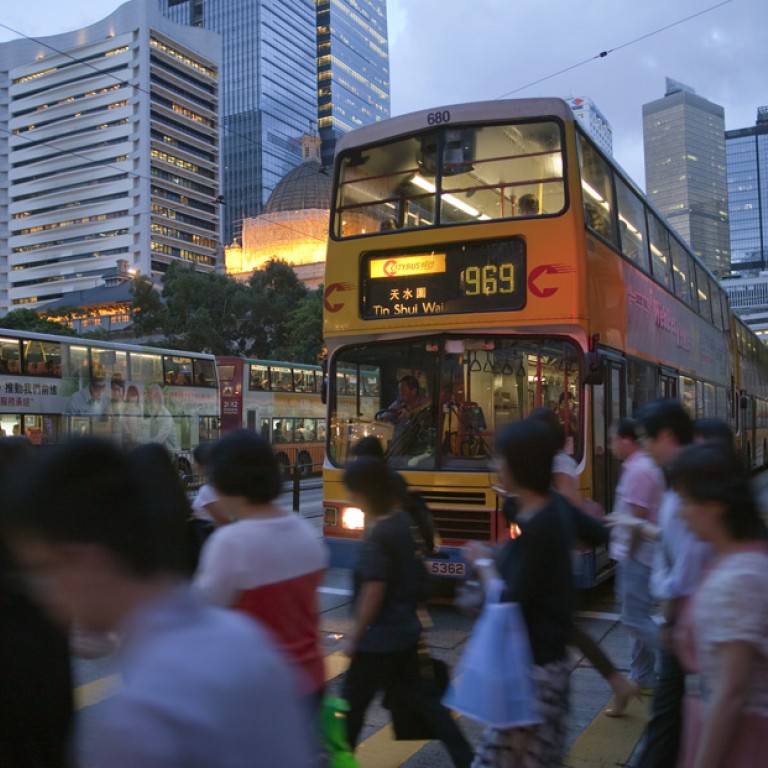
Hong Kong's timid leaders lack vision
Philip Bowring says Hong Kong's do-nothing leaders could learn something from Beijing about bold ideas to solve the city's pressing problems, starting with the ageing population
When will Hong Kong's government and civil service leaders grow up? It seems they are incapable even of thinking beyond the baby steps they propose to meet Hong Kong's most obvious problems. They have a lot to learn from Beijing on the eve of the Communist Party plenum, where high-level advisory bodies and think tanks have been proposing bold ways for China to move ahead.
They include such items as freeing up interest rates, a road map to full currency convertibility, abolition of the system, ending of preferences for state enterprises, and creating a market in land-use rights.
Of course we know that a lot of this will not happen. Interest groups within the closed political system will likely frustrate reform. But at least China has people near the top with vision. Where are their equivalents in Hong Kong? For sure, Hong Kong's political system can be an obstacle to change, but ultimately its more open system should be better capable of bringing about change for the common good than a one-party state. But timid men in well-paid, secure jobs are failing the community.
Take the issue of the ageing population. There is a suggestion of setting aside HK$60 billion for a fund to support the ageing poor. This is a derisory sum; it compares with the HK$24 billion which sits in the Civil Service Pension Reserve Fund for that spoiled class in the unlikely event that the government itself could not pay their pensions out of recurrent revenue.
What current and future pensioners - those reaching 65 to 70 over the next 15 to 20 years - deserve is a share of the vast surpluses built up by their toil over the previous four decades. These are currently HK$1.3 trillion - some HK$674 billion in fiscal reserves plus the HK$637 billion accumulated surplus of the Hong Kong Monetary Authority.
It is often forgotten that much of the surplus has arisen as a direct result of devaluation of the Hong Kong dollar, whether in the period immediately before the peg or as a result of subsequent US dollar weakness, against some currencies in which assets are held. The Exchange Fund has benefited at the expense of savings eroded by inflation.
Lower income groups mostly save through bank accounts. But decades of mostly negative real interest rates have eroded their savings to the advantage of the banks, the developers and those already sufficiently well-off to be able to borrow and enjoy many years when assets prices have outstripped rises in earnings. While the small savers earned nothing, the HKMA was able to reap the higher returns available in bond markets. It is of course entirely coincidental that the non-official members of the fund's advisory board are bankers and property developers.
It is time for the government to give back to the people - the older ones in particular - the HKMA's gains which accrued at the cost of the people, not as a result of clever management. These reserves are not required for currency stabilisation, for which the HKMA has more than enough other assets and tools.
Hence the sum the government should be thinking about is not HK$60 billion but HK$600 billion. It can still be managed by the HKMA as part of the Exchange Fund but its income and some of its capital must be earmarked for a pension system which does not leave frugal hard-working people in abject post- retirement poverty.
On the question of advancing the retirement age, the civil service (and quasi-government bodies like the universities) set the worst possible example. Retirement at 60, or even earlier, mainly benefits the upper echelons who then get cushy jobs in the private sector peddling their connections to the bureaucracy. Lower ranks can find difficulty in finding new jobs.
Health is the only reason for retiring before 65. Those in services requiring a higher level of physical fitness should have the option of redeployment in other parts of the civil service. Ultimately the general retirement age probably needs moving to 70.
A previous column addressed the meaningless baby steps being touted to raise the fertility rate. One of those baby steps - tax breaks - is being proposed for health insurance. Yet again this is a device aimed not at dealing with an issue at its root but adding to the income and wealth divide by favouring one class of citizen - mostly the high-income one - over the rest.
The iniquities of the high-land- price policy, and the lock of the Heung Yee Kuk, are well enough known. But fellow columnists have recently drawn attention to the abuse of public housing as a result of government unwillingness to enforce rules meant to keep it for those who need it. Likewise, feeble administration allows tens of thousands of flats to remain vacant.
There is no need to repeat here details of the deliberate failure to address pollution issues, have a rational pricing system for tunnel and highway use, or even begin to think about modernising the tax structure. Bold policies on all these issues are within easy reach and maybe some Beijing think tanks could spell them out for our do-nothing leaders.
Only then will we know if the legislature is the obstacle to change that officials suggest, rather than timid men taking refuge in "seeking consensus".

